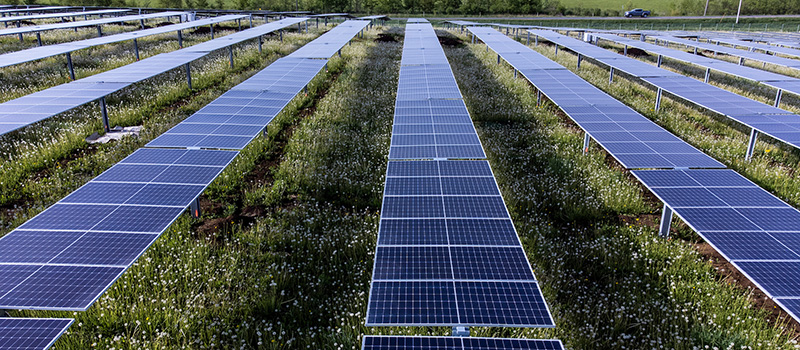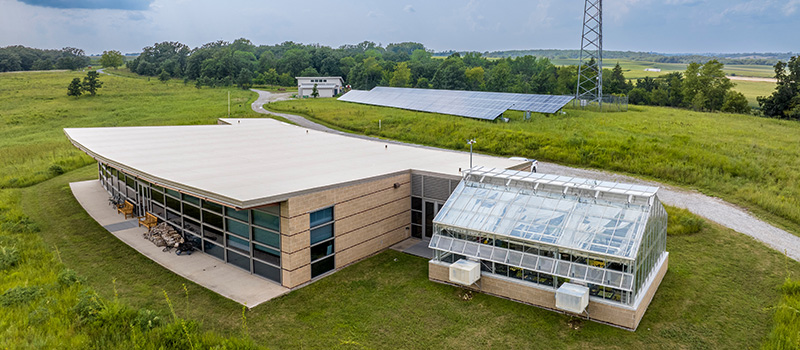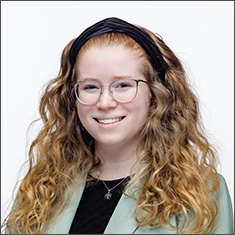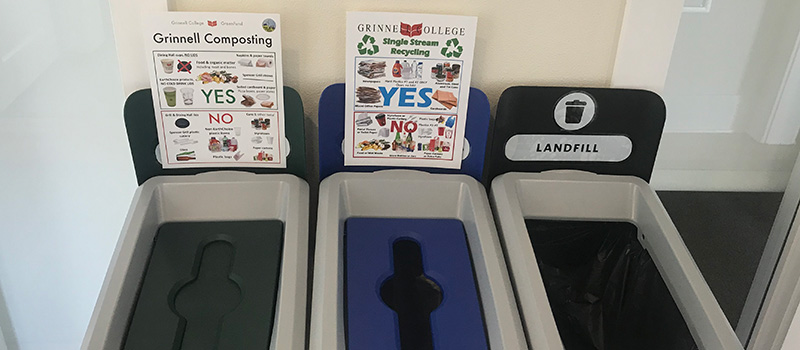Young alums reflect on lessons learned from addressing sustainability at Grinnell
May 23, 2024 — On 16th Avenue in the northern reaches of Grinnell, a 4-megawatt solar array has come to life, providing nearly one-third of the energy needed for the Grinnell College campus.
 North of campus, Grinnell College’s new solar array is now turned on. The panels follow the sun’s movement across the sky to maximize energy absorption.
North of campus, Grinnell College’s new solar array is now turned on. The panels follow the sun’s movement across the sky to maximize energy absorption.
For Grinnell’s students and young alums, the newly completed solar farm is the latest project providing them an opportunity to learn more about the science, politics, and other factors surrounding sustainability. Research on this and other efforts on a variety of campus sustainability projects have led to valuable experiences, including internships and jobs.
 Nameera Muhammad
Nameera Muhammad
Dawood ’23
Turned on in late April after several years of construction, the array is the largest private solar installation in Iowa. “This solar project is a huge step toward reaching our commitment of carbon neutrality,” says Chris Bair ’96, the College’s environmental and safety coordinator.
The College adopted a formal Sustainability Plan in 2018 as a living blueprint to increase environmental sustainability and move toward a goal of net-zero greenhouse gas emissions by 2040.
In 2022, Nameera Muhammad Dawood ’23 met with Bair to talk about installing more solar panels on campus. It was an issue that struck her during the pandemic when she and other international students remained on campus.
“Despite how few students there were, all the lights were on day and night, all over campus. We didn’t think they should all be on,” says Dawood, who was a computer science major. “I was already part of a Green Fund Committee and saw how student activism can be effective if you work together.”
She and Bair met several times and eventually an energy company survey was done, mapping where solar panels would be most effective across campus. “In addition to the environmental impact, we found that the College would profit as well in the long run – it was a good financial investment,” Dawood says.
 The solar panels at Conard Environmental Research Area (CERA) are modeled to provide 100 percent of the Environmental Education Center’s electricity.
The solar panels at Conard Environmental Research Area (CERA) are modeled to provide 100 percent of the Environmental Education Center’s electricity.
A Student Government Association (SGA) senator at the time – part of her election platform was to install more solar panels on campus – Dawood proposed that the SGA allocate funding to a solar project at Conard Environmental Research Area (CERA). The solar panels are modeled to provide 100 percent of the Environmental Education Center’s electricity.
Dawood presented a draft resolution that the SGA Senate voted to fund, allocating $20,000 to the $200,000 project, and along with a gift from Karen Van Dusen ’77 and Retired Trustee Joel Spiegel ’78, the CERA solar panels became a reality.
“It was really cool to see how much this would save, in terms of pollution and money,” Dawood says. “It was a very good project all around, and to have the support of Chris, the Office of Finance and Treasurer, the SGA, the donors, and the energy company showed me that this stuff is possible. Even if it demands a huge budget, you can get it done.”
Dawood says her on-campus advocacy prepared her to be a more vocal leader. “It was inspiring to do this – it really was a formative experience,” she says.
 Sharene Gould Dulabaum ’22
Sharene Gould Dulabaum ’22
Sharene Gould Dulabaum ’22 has been involved in environmental issues since high school, so going into Grinnell, “I knew I’d want to continue my involvement in sustainability.” The biology and political science major had a tutorial on climate change with Rosenfield Professor Wayne Moyer, and in her Introduction to Biological Inquiry course with Professor Peter Jacobson, she learned how climate change affects organisms.
“I thought I would become a scientist and help address climate change,” she says. “Then, I realized I needed additional tools to help implement solutions, so I became interested in political science, understanding our system, and how we can create change.”
She joined the Student Environmental Committee and served on the Center for Prairie Studies Advisory Board, among other groups. During the pandemic she worked remotely for Bair and Biology Lecturer Liz Queathem, researching how College practices aligned with sustainability goals.
Gould Dulabaum served as a composting/waste coordinator her fourth year, and she was awarded funding through the Donald and Winifred Wilson Center for Innovation to implement a pilot program to reduce the amount of campus waste being sent to the landfill. After observing that many students failed to properly sort their trash into compost, landfill, and recycling, Gould Dulabaum proposed a new system of centralized waste bins that would standardize and streamline the process of sorting waste, saving the College money.
 As a composting/waste coordinator her fourth year at Grinnell, Sharene Gould Dulabaum ’22 proposed a new system of centralized waste bins.
As a composting/waste coordinator her fourth year at Grinnell, Sharene Gould Dulabaum ’22 proposed a new system of centralized waste bins.
Today she works for county governments as a water resources professional, focusing on enhancing the natural drainage system, reducing flood damage, and improving water quality. She also volunteers as a commissioner on her city’s Sustainability Commission, making recommendations to the city council and helping to implement projects.
“I don’t think I’d be where I am now without all my Grinnell experiences,” Gould Dulabaum says. “For example, working as a sustainability coordinator and research assistant, competing for grant funding, and implementing projects – all of those experiences really helped me after graduation. I’ll always be grateful to Chris and Liz and many other outstanding mentors at Grinnell.”
— by Anne Stein ’84